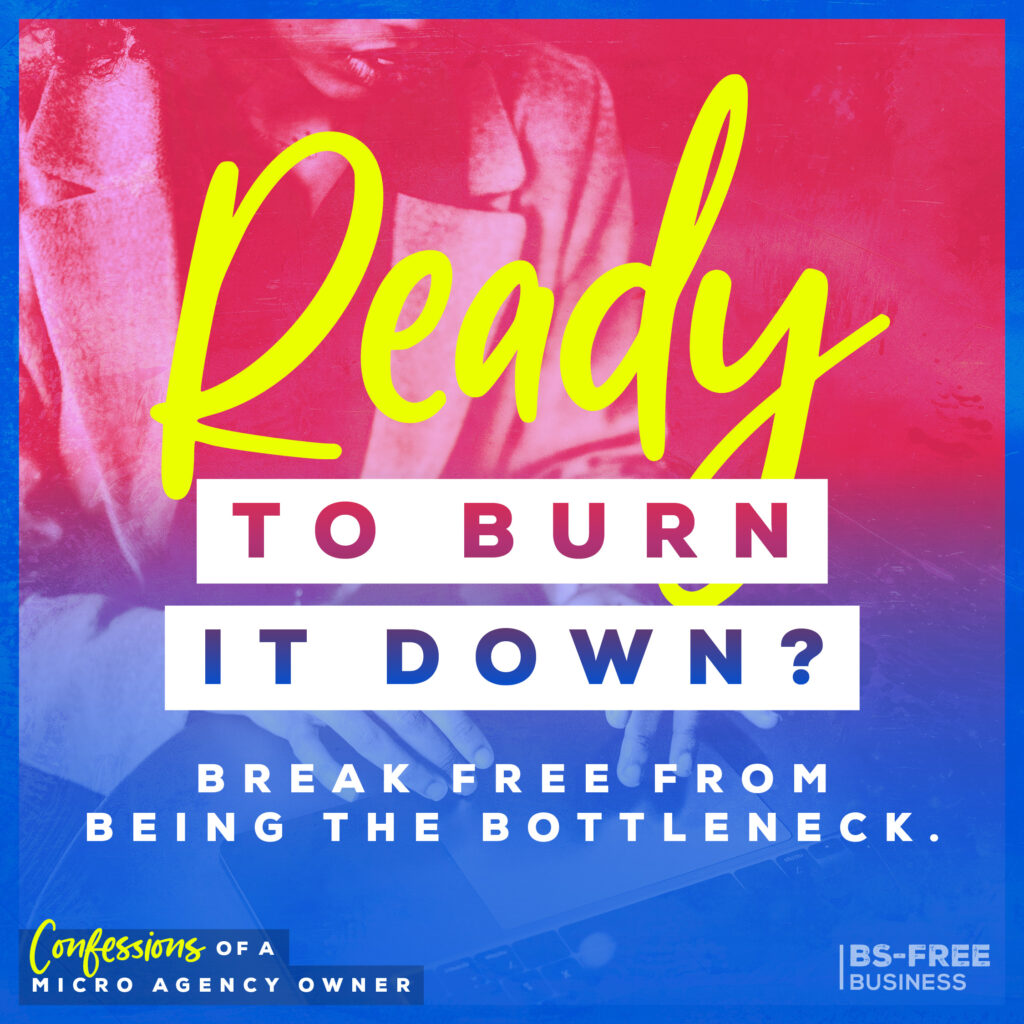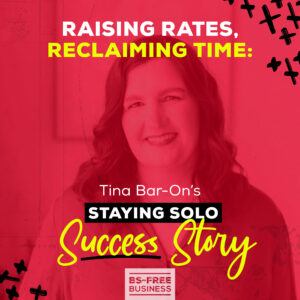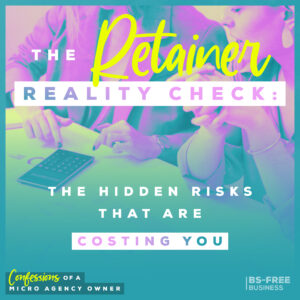
Search the site:
Ready to Burn It Down? Break Free from Being the Bottleneck
Ever feel like your micro agency is stuck in quicksand, with every decision dragging you down? If you’re constantly giving the green light, and nothing moves without you, you’re probably the bottleneck—and it’s time to break free.
In this episode, we’ll uncover why you’re the bottleneck (spoiler: it’s not always what you think) and, more importantly, how to build a business that runs smoothly without needing to be in the driver’s seat every second. Let’s get you out of your own way, once and for all.
Listen to this episode now:
Today, we’re diving into a topic that’s probably been a thorn in your side for a while now—being the bottleneck in your agency.
You know that feeling when everything seems to pile up, and nothing seems to move unless you give it the green light? Yeah, we’ve all been there.
You’re not alone if you feel like you’re the bottleneck in your business. But more importantly, you’re not always the problem—at least not in the way you might think.
In this episode, I’ll share why you may be the bottleneck (some of which might surprise you) and how to build things so you don’t want to burn them all to the ground. By the end of this episode, you’ll have actionable ideas to help you stop being the bottleneck
Bad and Broken Advice About Bottlenecks
Let’s talk about what you’ve probably heard before—the conventional wisdom on how to deal with being a bottleneck. Typical solutions include “delegate more,” “hire faster,” or, my personal favorite, “just automate it.”
Sounds simple! But here’s the thing—this advice isn’t always right for you as a micro agency owner.
Take, for example, delegation. It’s great in theory, but you need the right team and systems in place. And when you delegate without a plan, it creates way more problems than it solves.
You spend more time training, overseeing, and correcting mistakes than just doing it yourself. So then you stop delegating as you’re frustrated, and you’ve done nothing to fix the underlying problem.
Another standard solution is hiring, which I’ll admit can help you create a team structure and workflow that means you’re not the bottleneck. But if you’ve ever hired, you know this is not a fast or cost-effective solution. Throwing people (and money) at the problem can compound stress and create even more bottlenecks.
And finally, automation. I love automation, but only some things can be fixed with tech. Using automation to solve deeper operational issues is like putting a band-aid on a broken leg; eventually, it will come back and bite you.
None of these so-called “solutions” are quick fixes; they’re nuanced and must be done methodically to help you solve systemic problems in your micro agency.
The Real Problem—It’s Not Just You
Now, let’s get honest about what’s happening here. Yes, you might be the central figure in your agency—everything might seem to revolve around you—but that doesn’t mean you need to be involved in everything.
When you think about where you’re being the bottleneck, it’s likely because you’re involved in everything, and decisions are piling up because no one else can move forward without your say-so.
Real talk. Yes, that can result from you being a complete control freak, but there’s always more to the story.
This comes down to trust. If you don’t trust your team to make those decisions or send the client the deliverables, what’s going on? Let’s look at three common issues and how to address them in your micro agency.
Your Team: Gaps in Skills and Experience
First, ask yourself: Does your team have the skills and experience to consistently deliver quality work? If not, what do they need to do to get there?
Sometimes, the problem isn’t their lack of effort or willingness—it’s a gap in skills or experience that hasn’t been addressed. This could be due to a lack of training, unclear expectations, or hiring mistakes.
When you hire, it’s an act of hope. However, you need to be realistic about what we need from each team member and recognize that no one person will magically solve our problems.
Take a look at your team right now. Where are the gaps? Are there specific areas they’re falling short? What roles do you need to fill? What skills are needed or lacking?
As you do this, focus more on the capabilities you need on your team than the actual people. The goal is to look at your team holistically to examine what’s going on and not get hung up on minutia.
I often recommend that my micro agency clients examine this from an organizational chart perspective, with the roles and skills needed, as it helps identify gaps and opportunities.
Once you pinpoint these, consider what they need to close those gaps. It might be additional training, mentoring, or hiring new team members with the right expertise.
And here’s the tricky question: Are you holding on to people who aren’t the right fit for your agency’s needs? It’s never easy, but sometimes, the best way to eliminate a bottleneck is to ensure you have the right people in the right roles.
Finally, recognize what you may be doing outside your zone of genius. What are the tasks that genuinely require your expertise? What can someone else do, even if it’s not exactly how you would do it?
Last year, one of my micro agency clients was bogged down by being the only senior person on her team. For a long time, she needed help figuring out how she could ever get someone else to help. After a very frustrating few months, she hired someone at the director level to oversee clients and team members, and it’s been a game changer for her.
Financially, it was a bit of a reach, but she’ll be the first to tell you that she wishes she’d done it sooner as it freed her up to do the work she wanted and to have more time away from the business.
It’s a good reminder that your team should have the skills and experience you need so that you can offload tasks that are draining or not a good use of your team. This might mean bringing in a specialist or simply delegating to a team member who can handle it. The goal is to keep you focused on the high-impact activities only you can do.
Your Systems and Processes
Next, let’s dive into the heart of any sustainable micro agency—your systems and processes. These are the backbone of how your team operates day in and day out.
But here’s the big question: Does your team have the systems they need to do their jobs effectively, or are your workflows so complicated that they’re slowing everyone down.
It’s a common trap to fall into—thinking that adding more steps, checks, or approval layers ensures higher quality. On the surface, it seems logical, right? More oversight should equal better results.
But, overcomplicating your processes can create a tangled web that does more harm than good. When your systems are too convoluted, they don’t just slow things down; they introduce confusion, frustration, and, ultimately, more work for you as the agency owner. Instead of streamlining operations, you find yourself stuck in the weeds, constantly troubleshooting and micromanaging.
This complexity can lead to delays in project timelines because your team spends more time navigating the process than actually doing the work. It can also cause confusion, with team members needing clarification on the correct steps to take or who needs to approve what.
It inevitably leads to you becoming the bottleneck—everything ends up on your plate because no one else can move forward without your input. This is the exact opposite of what you want.
So, how do you fix this? The answer lies in simplifying where you can. Start by taking a step back and reviewing your existing processes. Are all those steps necessary, or have they just been added over time without much thought? Maybe a step has become redundant as your micro agency has grown, or perhaps an approval layer isn’t adding value anymore.
Get feedback from your team and get them involved in simplifying everything. As the ones who work with the processes daily, they see the problems, so they’re uniquely qualified to make recommendations on how to fix them.
Simplifying your processes doesn’t mean sacrificing quality. It’s the opposite.
Clear, straightforward processes empower your team to work more independently and efficiently, which actually improves the quality of work. When everyone knows exactly what they need to do, how to do it, and who to turn to if there’s an issue, things flow more smoothly.
Stop Micromanaging, Start Leading
Now, here’s a big one: Are you inserting yourself where you don’t need to be?
As micro agency owners, it’s natural to want to be involved in every aspect of the business, but there’s a fine line between being hands-on and micromanaging. If you’re constantly stepping in, even when it’s not necessary, you might be unintentionally undermining your team’s confidence.
When your team sees you swoop in to make decisions or fix things, they might doubt their abilities. This can lead to a vicious cycle where they become overly reliant on you, further reinforcing the bottleneck.
Breaking this cycle means trusting your team and giving them the space to make decisions and learn from their mistakes. It’s about stepping back and allowing them to grow into their roles.
You need to trust your team and get okay with potential mistakes.
Two things that I’ve found helpful in empowering my team are ensuring they know our values and creating a decision-making framework.
With values, they know our commitment to our clients is to make things incredibly simple for them. So, if they decide what to do, they can return to what would make this simple for the client. What ensures they have a good experience?
The decision-making framework is a set of rules that say I trust you do X, and you don’t need my approval. You can use this for anything from spending decisions to how to answer a client’s question. We started with lower-stakes things; over time, I’ve made it clear that I trust them to handle things without me.
None of this means I’m not involved; it just means there’s a balance between guidance and autonomy. When you do this, you’re not just removing a bottleneck but also fostering a more confident, capable team that can operate effectively without your constant input.
Remember, the goal is to build a system where your team functions smoothly, even when you’re not directly involved in every decision.
Addressing these issues—skill gaps, overly complicated processes, or your tendency to insert yourself—can eliminate the bottlenecks holding your micro agency back and making you want to throw your laptop off a cliff.
A Needed Mindset Shift—Letting Go to Grow
I know what some of you might think: “If I let go of too much, things will fall apart.” That fear of losing control is totally normal.
The mindset shift from doing everything yourself to letting go can be challenging. You’ve built your micro agency from the ground up, and the idea of stepping back can feel like a huge risk.
But here’s the truth: letting go is not just a nice-to-have—it’s necessary for growth.
If you’re always the one holding the reins, your agency’s growth is limited to what you can personally handle, which completely defeats the point of the micro agency model.
By holding on too tightly, you’re not only preventing your team from stepping up but also stifling your own ability to focus on the bigger picture.
So, what does letting go mean? It’s about trusting your team, your processes, and even yourself to make the right decisions.
It means recognizing that while you may be great at what you do, you don’t have to do it all. Your value as a leader isn’t in the minutiae of every decision but in steering the ship, setting the course, and ensuring that everyone is aligned with your vision.
Letting go doesn’t mean you’re abdicating responsibility. It’s about empowering your team to take ownership of their roles and trusting that they’ll do what needs to be done. It’s about creating a culture where your team feels confident making decisions, knowing they have your support. And it’s about believing that your processes, which you’ve worked hard to develop, are strong enough to keep things running smoothly without your constant oversight.
The mindset shift here will take time, so you must start with small, manageable changes. For instance, begin by delegating a task you usually handle but someone on your team can manage. See how it goes. Measure the impact. Did it free up your time? Did it empower your team members? If the answer is yes, then you’re on the right track.
Another small step might be to set boundaries on when and where you insert yourself into the workflow.(Warning: This can be hard, so resist jumping in.)
Maybe you don’t need to review every email that goes out, or you limit the meetings you attend to those where your strategic input is genuinely required. These might seem like minor adjustments, but they can seriously impact your workload and the team’s autonomy.
The key here is implementing one change at a time, measuring its impact, and adjusting as needed. This way, you’re not throwing everything up in the air and hoping it lands nicely—you’re making calculated, thoughtful changes that lead to real progress.
Over time, these small steps will add up to big changes. You’ll notice that your workload is lighter, your team is more confident, and your micro agency is running more smoothly.
More importantly, you won’t be the bottleneck anymore, the pile of work you have to do will shrink, and you’ll feel less like you’re on the hot mess express to Burnoutville.
From Bottleneck to Balance: Shrink Your Stress and Your To-Do List
As we wrap up today’s episode, remember that being the bottleneck doesn’t mean you’re failing as a leader—it’s simply a sign that it’s time to evolve your role within your agency.
By trusting your team, simplifying your processes, and letting go of the need to control every detail, you’re not just removing roadblocks—you’re paving the way for sustainable growth. This shift isn’t just about making your life easier; it’s about building a business that’s not reliant on you for everything.
Take a deep breath and start with a tiny change. Whether delegating a task, streamlining a process, or stepping back from the day-to-day, each step you take towards letting go will bring you closer to a more resilient and successful micro agency.

I’m Maggie Patterson (she/her), and services businesses are my business.
I have 20+ years of experience with client services, am a consultant for agency owners, creatives, and consultants, and vocal advocate for humane business practices rooted in empathy, respect, and trust.
For Solo Business Owners

Growing a solo service business is tough.
It’s even harder when you’re bombarded with BS advice that steers you away from your values and why you started your business in the first place.
This is the podcast for solo creatives and consultants who want to remain as a team of one and have zero interest in the hustle and grind of typical business teachings.
Subscribe now and never miss an episode.
For Micro Agency Owners
Most podcasts for agency owners obsess over revenue growth as the ultimate success metric.

But here’s the truth: not everyone wants to make millions. Your goal might be to build a sustainable business that lets you have a life and doesn’t run you into the ground.
Join me as I spill my shameless confessions and share everything I’ve learned about building a micro agency that skips the BS of tired and typical agency teachings.
Follow Now on All Major Podcast Platforms








